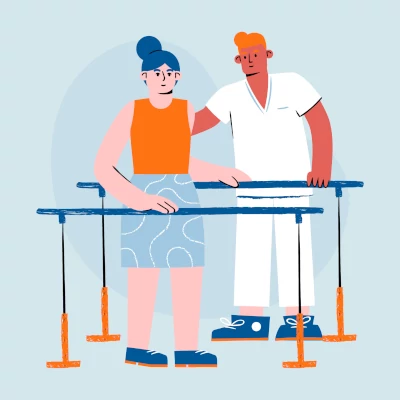Rehabilitation is a vital process that helps individuals recover from physical or mental illness or injury. It is a journey that requires patience, dedication, and support from healthcare professionals, family, and friends. In this article, we will discuss the various aspects of rehabilitation, including its importance, types, and benefits.
What is Rehabilitation?
Rehabilitation is the process of restoring function and improving the quality of life of individuals affected by physical or mental illness, injury, or disability. It involves various interventions, including medical, physical, occupational, and psychological therapies, to help patients regain their independence and achieve their goals.
Importance of Rehabilitation
Rehabilitation is crucial for patients who have suffered a stroke, spinal cord injury, traumatic brain injury, or any other medical condition that affects their ability to perform daily activities. It helps them overcome physical and psychological barriers and return to their daily routines.
Rehabilitation also plays a significant role in preventing complications and reducing the risk of secondary health problems. It helps patients manage their pain, improve their mobility and strength, and reduce their dependence on medication.
Types of Rehabilitation
Rehabilitation can be broadly classified into two categories: Inpatient and outpatient rehabilitation.

Inpatient Rehabilitation
Inpatient rehabilitation is provided to patients who require intensive, 24-hour medical and nursing care. Patients receive rehabilitation therapy in a hospital or specialized rehabilitation center, where they stay for a period of several weeks to months.
Outpatient Rehabilitation
Outpatient rehabilitation is provided to patients who do not require 24-hour medical care and can travel to a rehabilitation facility for therapy sessions. Patients may receive physical, occupational, or speech therapy as needed, and the duration of the rehabilitation program depends on the patient’s needs.
Benefits of Rehabilitation
Rehabilitation offers numerous benefits to patients, including:
- Improved Physical Function
Rehabilitation helps patients regain their strength, flexibility, and coordination, enabling them to perform daily activities and improve their overall physical function.
- Pain Management
Rehabilitation can help patients manage their pain by using various techniques such as exercise, massage, and hot/cold therapy.
- Emotional Support
Rehabilitation can provide patients with emotional support to help them cope with the psychological impact of their illness or injury. It can also help them develop coping strategies to manage stress and anxiety.
- Increased Independence
Rehabilitation can help patients regain their independence and reduce their dependence on caregivers or family members.
- Better Quality of Life
Rehabilitation can improve the quality of life of patients by helping them achieve their goals, maintain their social connections, and participate in their favorite activities.
Conclusion
Rehabilitation is a critical aspect of healthcare that helps patients recover from illness or injury and regain their independence. It is a journey that requires patience, dedication, and support from healthcare professionals, family, and friends. By understanding the importance, types, and benefits of rehabilitation, we can help patients achieve their goals and improve their quality of life.
FAQs
Who can benefit from rehabilitation?
Rehabilitation can benefit anyone who has suffered a physical or mental illness, injury, or disability.
How long does rehabilitation take?
The duration of rehabilitation depends on the patient’s needs and can vary from several weeks to several months.
Is rehabilitation painful?
Rehabilitation can be challenging, but it should not be painful. Healthcare professionals will work with patients to manage their pain and discomfort.
What is the role of family and friends in rehabilitation?
Family and friends play a crucial role in providing emotional support and encouragement to patients during their rehabilitation journey.
Can rehabilitation prevent future health problems?
Yes, rehabilitation can help prevent future health problems by improving physical function, managing pain, and reducing the risk of complications.
The journey toward recovery can be a challenging one, but with the guidance and support of a skilled physiotherapist, it can be a journey filled with hope and progress. Physiotherapists play a crucial role in the rehabilitation of patients, helping them overcome physical limitations, regain strength and mobility, and achieve their goals. From the initial assessment to the development of a tailored treatment plan, the role of a physiotherapist is multifaceted and essential in the recovery process.
So, what exactly is the role of a physiotherapist in the rehabilitation of a patient? Let’s explore this further.
Featured image by Freepik



